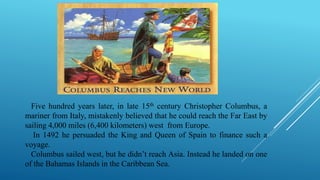Lecture 1.2
•Transferir como PPTX, PDF•
1 gostou•223 visualizações
Settlers
Denunciar
Compartilhar
Denunciar
Compartilhar

Recomendados
Recomendados
Mais conteúdo relacionado
Mais procurados
Mais procurados (19)
Theme 7 pt 1 american colonies - prelude to revolution

Theme 7 pt 1 american colonies - prelude to revolution
Destaque
Destaque (15)
Semelhante a Lecture 1.2
Semelhante a Lecture 1.2 (20)
explorationandcolonizationpowerpoint-121126072114-phpapp02 (2).pdf

explorationandcolonizationpowerpoint-121126072114-phpapp02 (2).pdf
CHAPTER 2Early Globalization The AtlanticWorld, 1492–16.docx

CHAPTER 2Early Globalization The AtlanticWorld, 1492–16.docx
THE AMERICAN YAWPMenuSkip to contentHomeAboutBarbara Jordan – On the.docx

THE AMERICAN YAWPMenuSkip to contentHomeAboutBarbara Jordan – On the.docx
Mais de barkasivv
Mais de barkasivv (9)
Último
Último (20)
Beyond_Borders_Understanding_Anime_and_Manga_Fandom_A_Comprehensive_Audience_...

Beyond_Borders_Understanding_Anime_and_Manga_Fandom_A_Comprehensive_Audience_...
ICT role in 21st century education and it's challenges.

ICT role in 21st century education and it's challenges.
General Principles of Intellectual Property: Concepts of Intellectual Proper...

General Principles of Intellectual Property: Concepts of Intellectual Proper...
Interdisciplinary_Insights_Data_Collection_Methods.pptx

Interdisciplinary_Insights_Data_Collection_Methods.pptx
Basic Civil Engineering first year Notes- Chapter 4 Building.pptx

Basic Civil Engineering first year Notes- Chapter 4 Building.pptx
UGC NET Paper 1 Mathematical Reasoning & Aptitude.pdf

UGC NET Paper 1 Mathematical Reasoning & Aptitude.pdf
Sensory_Experience_and_Emotional_Resonance_in_Gabriel_Okaras_The_Piano_and_Th...

Sensory_Experience_and_Emotional_Resonance_in_Gabriel_Okaras_The_Piano_and_Th...
Micro-Scholarship, What it is, How can it help me.pdf

Micro-Scholarship, What it is, How can it help me.pdf
Unit 3 Emotional Intelligence and Spiritual Intelligence.pdf

Unit 3 Emotional Intelligence and Spiritual Intelligence.pdf
Lecture 1.2
- 1. Five hundred years later, in late 15th century Christopher Columbus, a mariner from Italy, mistakenly believed that he could reach the Far East by sailing 4,000 miles (6,400 kilometers) west from Europe. In 1492 he persuaded the King and Queen of Spain to finance such a voyage. Columbus sailed west, but he didn’t reach Asia. Instead he landed on one of the Bahamas Islands in the Caribbean Sea.
- 2. Columbus returned home with gold, and within 40 years treasury-hungry Spanish adventurers conquered a huge empire in South and Central America. The Spanish also established some of the earliest settlements in North America– St. Augustine in Florida (1565), Santa Fe in New Mexico (1609) and San Diego in California (1769) When Columbus and later Spanish explorers returned to Europe with stories of gold in the Americas, each European sovereign wanted to claim as much territory as possible in the New World along with its wealth. Spanish priests also wanted to convert the inhabitants of the Americas to Christianity.
- 3. The first successful English colony in the Americas was founded at Jamestown, Virginia, in 1607.The Virginias discovered a way to earn money by growing tobacco, which they began shipping to England in 1614.
- 4. In New England (the north-eastern region of what is now the United States), several settlements were established by English Puritans. One group of Puritans, called the “Pilgrims”, crossed the Atlantic in the ship May Flower and settled in Plymouth, Massachusetts in 1620.A much larger Puritan colony was established in the Boston area in 1630.The Puritans hoped to build “a city upon a hill” – an ideal community. The colonies of Maryland, settled in 1634 as a refuge for Roman Catholics, Pennsylvania founded in 1681 by the Quaker leader William Penn, were also characterized by religious toleration.
- 5. Over time, the British colonies in North America were also occupied by many non-British national groups. German farmers settled in Pennsylvania, Swedes founded the colony of Delaware, and African slaves first arrived in Virginia in 1619. In 1626 Dutch settlers bought Manhattan Islands from local Native Americans or “Indian” chiefs and built the town of New Amsterdam; in 1664 the settlement was captured by the English and renamed New York.
- 6. By 1770 several small but growing urban centres had emerged, each had newspapers, shops, merchants and craftsmen. Philadelphia, with 28,000 inhabitants, was the largest city, followed by New York, Boston and Charleston, South Carolina. Unlike most other nations, the United States never had a feudal aristocracy. There was a lot of land and very little labour force in colonial America, and every free man had an opportunity to achieve economic independence and prosperity.